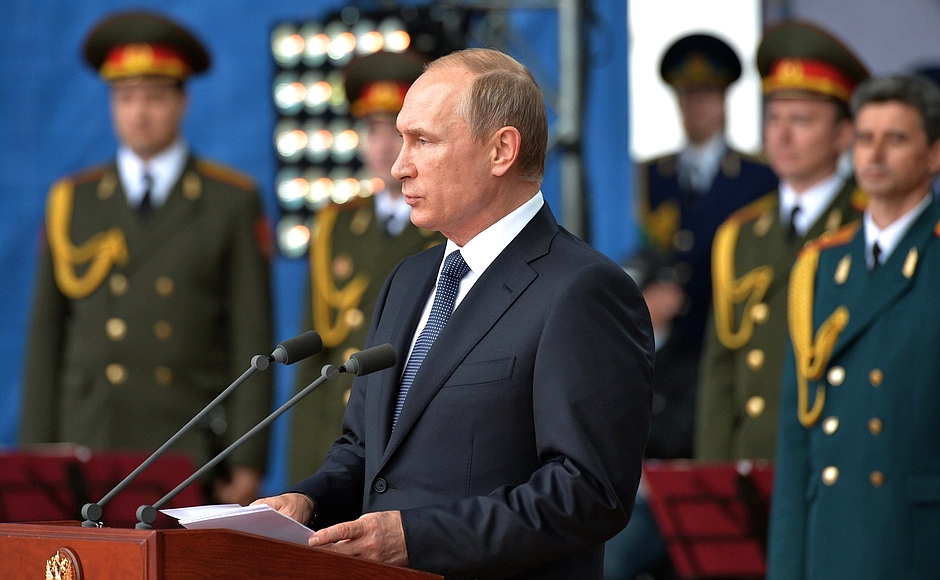Visit http://www.truebibleteaching.com/ for more great articles like this.
The Russians are back in the Middle East!

January 22, 2016, Friday/ 14:53:10/ FARUK LOĞOĞLU
Much is being said and written about the meaning and consequences of the latest Russian moves in the Middle East, particularly in Syria.
While perhaps it is too early to assess the mid and long-term effects of its growing presence in the region, it is possible to make a reasonable analysis of Russia’s motives and intended purposes. Here is a brief review of the whys of the substantial Russian return to the Middle East.
First, it is part of President Vladimir Putin’s drive to reassert and project Russian power in nearby regions where after the collapse of the Soviet empire, the Russians had been largely absent. Putin has been unhappy with NATO’s continuing expansion and felt the need to do something in response to it. His NATO-discomfort was compounded by Western sanctions over his Ukraine-intervention and Crimea-annexation.
Then the defining moment came: The increase of the Islamic State in Iraq and the Levant’s (ISIL) sphere of influence in Syria and Iraq provided the golden opportunity Putin needed to make his planned move into the region by enabling him to decisively strengthen his military muscle in Syria. Thus, Russia not only returned to the Middle East with an impressive array of weaponry, but also deflected Western attention away from the Ukraine crisis toward the joint fight against ISIL. Russia succeeded in making its intervention part of the “fight against terrorism” narrative.
Second, the Russian move was a) to support its longtime ally the Syrian regime in the ongoing civil war; b) to protect its military facilities in the country, Tartus and others; c) to ensure a strong seat for itself and for the Syrian regime in the forthcoming diplomatic negotiations on Syria’s future; and d) to balance Western powers in the east Mediterranean. Russia’s favored safe haven in the Middle East is Syria. At a time when the Bashar al-Assad regime needed it most, the Russian upgrading of its role and forces in Syria is intended for Russia to maintain an enduring and close connection with Syria. Even if Syria becomes divided, Russia will be content with that part of Syria that would remain faithful to its ties with Moscow.
Third, the direct threat posed by ISIL (DAESH) prompted Russia to take the fight away from home to Syria. The large numbers of Chechen fighters in ISIL’s ranks, continuing ISIL activities in the Caucasus and the danger of radicalization of Russia’s own Muslims are among the factors that propelled Russia to stop ISIL in Syria. Nonetheless, Russia’s operations are clearly aimed not just at ISIL targets, but also at anti-Assad groups such as the al-Nusra Front. The US and Europe got trapped in their own rhetoric of the priority of expanding the coalition fighting ISIL. Putin seized the occasion to engage in Syria in full force, and now he is aiding Assad but also fighting ISIL.
Fourth, an important factor that has driven Putin to enhance Russia’s strategic presence in the region has been the discovery of substantial reserves of natural gas in the eastern Mediterranean. Russia is a global energy player and wants not to be left out from this newly emerging energy-rich region. This explains why Russia wants to keep warm relations with Israel, Egypt and the Greek Cypriots.
Finally, Russia is also interested in forging new alliances to raise its influence in the region. Strengthening its solidarity with Syria and Iran, Russia also seeks to establish closer relations with Iraq and the Lebanese Hezbollah. The Russian military has command centers in both Damascus and Baghdad. This kind of power projection might complicate the sectarian divide in the Muslim world.
In short, Russia has made a grand move at a ripe moment to reclaim its great power status in the Middle East region for strategic, political and economic reasons. What the payoff and costs will be for Russia remain unclear at this stage. But what is clear is that the new Russia will be a leading player in the Middle East for better or worse.
Let’s remember that it was largely the Russian intervention that triggered the Vienna peace process. Now Russia’s continuing high-profile operations in Syria may inject a sense of urgency and inevitability for a negotiated political solution to end the Syrian conflict. Why? Simply because failure would put Russia and its allies in direct confrontation with the US and its allies, including Turkey. That is surely one prospect everybody would want to avoid.
According to Bible Prophecy Gog (the leader of Russia) and the EU will invade the Middle East in the Last Days coming down with great speed. This is what we read in Ezekiel 38:15-16 “And thou shalt come from thy place out of the north parts, thou, and many people with thee, all of them riding upon horses, a great company, and a mighty army: And thou shalt come up against my people of Israel, as a cloud to cover the land; it shall be in the latter days…”
So it is no surprise to Bible Students to see Russia back in the Middle East, in fact Bible Prophecy requires it to be so. This will be one of the signs of the Russia that will invade the Middle East at the time of the End that Ezekiel speaks of. Today we are witnessing the build up to these very events as predicted by the Bible 3500 years ago in Ezekiel 38 and in Daniel 11. Russia has now established a foothold which they will fully intend to maintain in the volatile Middle East.
Yet again we see in Todays News Headlines words that show how the Nations are fulfilling the latter day alignment of Nations as Prophesied by the Bible.
See this article below to learn more about this and the latter day prophecies of the Bible.
Bible Prophecy about the alignment of Nations in the Latter Days

